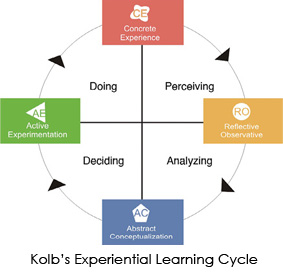Projects Experiential Learning Theory
Disha India is working with Experience based Learning Systems, USA, on how we can use experiential learning theory for designing the curriculum, pedagogy and practices in K-12 education.
Prof Kolb, the founder and chairman of EBLS, has developed a theory of learning from experience.
Theory of Experiential Learning
Learning is a process whereby knowledge and understanding is derived from and continuously modified by the experiences that a learner goes through. To learn is not the special province of a single specialized realm of human functioning such as cognition or perception. It involves the integrated functioning of the total being i.e. feeling, thinking, perceiving and doing. According to Dr. Kolb's theory of experiential learning, for effective learning one needs four different kinds of abilities and they are:
- The ability to immerse oneself fully, openly and without bias in new experiences (Concrete Experiencing)
- The ability to reflect upon and observe one's experiences from different perspectives (Reflective Observations)
- The ability to construct conceptual understanding that integrates one's observations into logically sound theories (Abstract Conceptualization)
- The ability to use these theories to make decisions and solve real life problems (Active Experimentation)
Learning cycle and flexibility
Based on the above theory of experiential learning, Dr Kolb has designed the Learning Style Inventory. The LSI helps people to understand their learning cycle, their preferred learning mode and the learning flexibility.
To know more about LSI, please
Disha India is working on how we can use LSI to develop the learning capacity i.e. learning how to learn among teachers and children in schools. The idea behind this is to design a curriculum and pedagogy which helps children in understanding and developing their learning how to learn capacity and empowers them to become self-learners for life.
Educator Role Profile
Educator Role Profile, an inventory designed by Dr Kolb, helps in understanding the different roles that an educator need to perform in facilitating the experiential learning. The four different roles that an educator needs to perform are –facilitator, subject expert, evaluator and that of a coach.
To know more about ERP, please
Disha India is doing a research with EBLS to find the connection between the LSI and ERP i.e. how personal learning style affects teaching style and vice-versa. We are also in the process of adapting the ERP for K-12 education and designing a development framework for K-12 educators.

